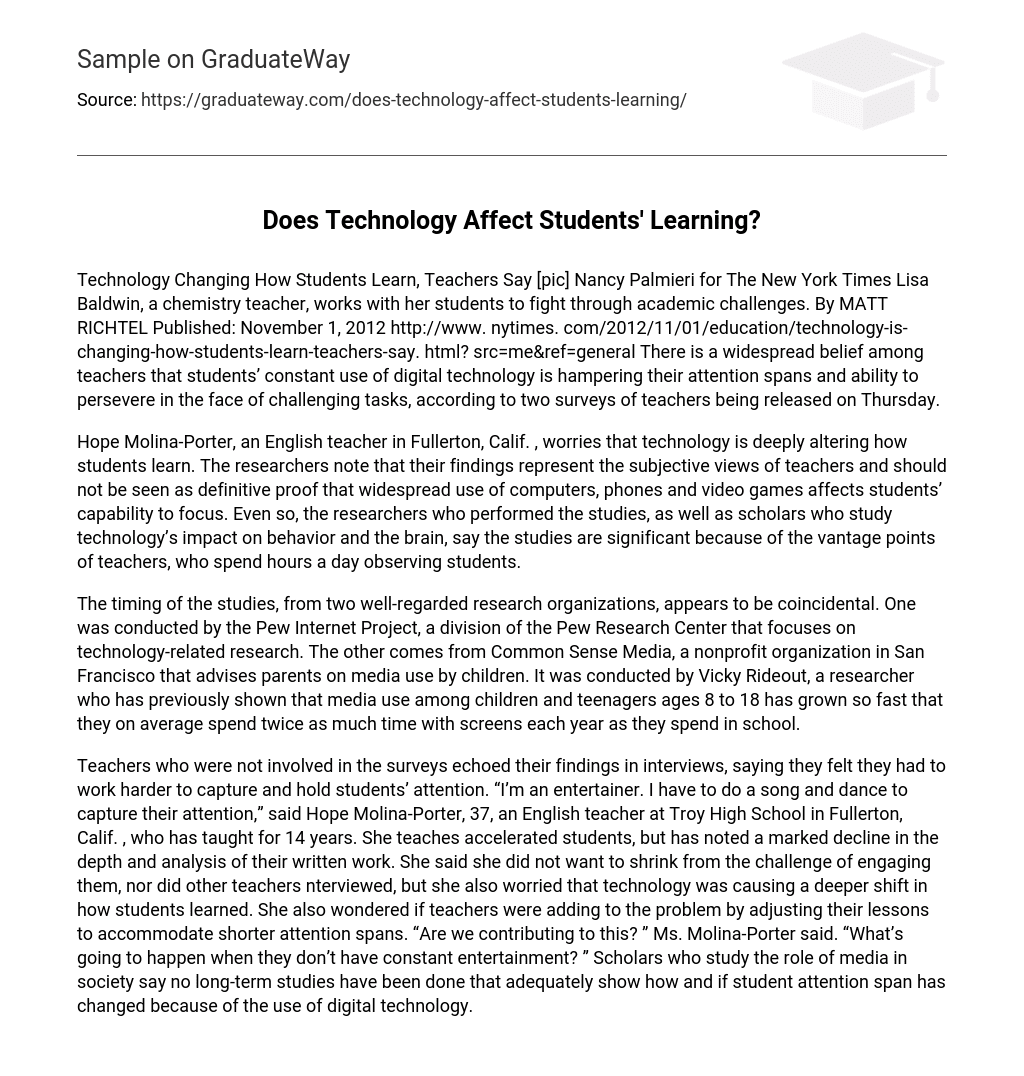There is a widespread belief among teachers that students’ constant use of digital technology is hampering their attention spans and ability to persevere in the face of challenging tasks, according to two surveys of teachers being released on Thursday.
Hope Molina-Porter, an English teacher in Fullerton, Calif. , worries that technology is deeply altering how students learn. The researchers note that their findings represent the subjective views of teachers and should not be seen as definitive proof that widespread use of computers, phones and video games affects students’ capability to focus. Even so, the researchers who performed the studies, as well as scholars who study technology’s impact on behavior and the brain, say the studies are significant because of the vantage points of teachers, who spend hours a day observing students.
The timing of the studies, from two well-regarded research organizations, appears to be coincidental. One was conducted by the Pew Internet Project, a division of the Pew Research Center that focuses on technology-related research. The other comes from Common Sense Media, a nonprofit organization in San Francisco that advises parents on media use by children. It was conducted by Vicky Rideout, a researcher who has previously shown that media use among children and teenagers ages 8 to 18 has grown so fast that they on average spend twice as much time with screens each year as they spend in school.
Teachers who were not involved in the surveys echoed their findings in interviews, saying they felt they had to work harder to capture and hold students’ attention. “I’m an entertainer. I have to do a song and dance to capture their attention,” said Hope Molina-Porter, 37, an English teacher at Troy High School in Fullerton, Calif. , who has taught for 14 years.
She teaches accelerated students, but has noted a marked decline in the depth and analysis of their written work. She said she did not want to shrink from the challenge of engaging them, nor did other teachers nterviewed, but she also worried that technology was causing a deeper shift in how students learned.
She also wondered if teachers were adding to the problem by adjusting their lessons to accommodate shorter attention spans. “Are we contributing to this? ” Ms. Molina-Porter said. “What’s going to happen when they don’t have constant entertainment? ” Scholars who study the role of media in society say no long-term studies have been done that adequately show how and if student attention span has changed because of the use of digital technology.
But there is mounting indirect evidence that constant use of technology can affect behavior, particularly in developing brains, because of heavy stimulation and rapid shifts in attention. Kristen Purcell, the associate director for research at Pew, acknowledged that the findings could be viewed from another perspective: that the education system must adjust to better accommodate the way students learn, a point that some teachers brought up in focus groups themselves.
“What we’re labeling as ‘distraction,’ some see as a failure of adults to see how these kids process information,” Ms. Purcell said. “They’re not saying distraction is good but that the label of ‘distraction’ is a judgment of this generation. ” The surveys also found that many teachers said technology could be a useful educational tool. In the Pew survey, which was done in conjunction with the College Board and the National Writing Project, roughly 75 percent of 2,462 teachers surveyed said that the Internet and search engines had a “mostly positive” impact on student research skills.
And they said such tools had made students more self-sufficient researchers. But nearly 90 percent said that digital technologies were creating “an easily distracted generation with short attention spans. ” Similarly, of the 685 teachers surveyed in the Common Sense project, 71 percent said they thought technology was hurting attention span “somewhat” or “a lot. About 60 percent said it hindered students’ ability to write and communicate face to face, and almost half said it hurt critical thinking and their ability to do homework. There was little difference in how younger and older teachers perceived the impact of technology.
“Boy, is this a clarion call for a healthy and balanced media diet,” said Jim Steyer, the chief executive of Common Sense Media. He added, “What you have to understand as a parent is that what happens in the home with media.





